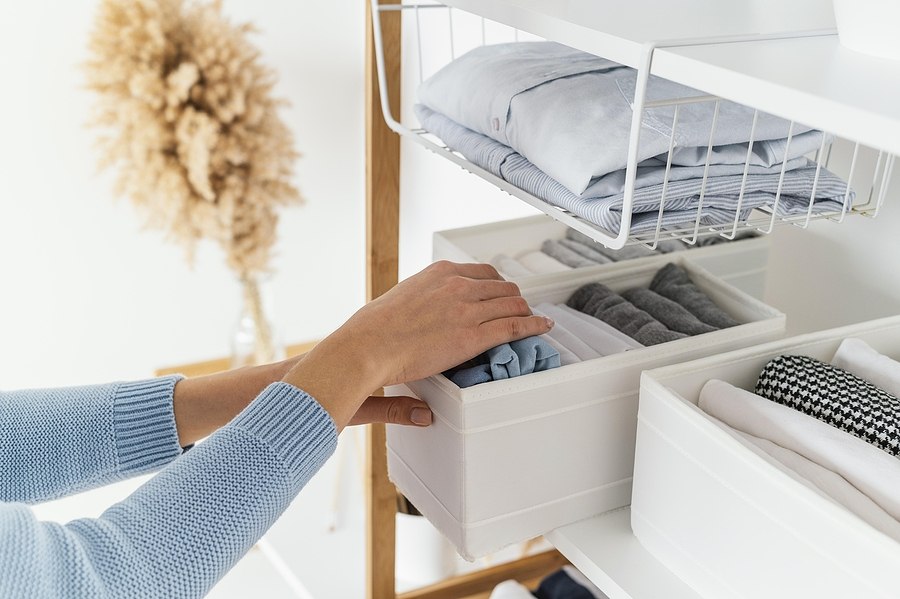Fall Cleaning: A Helpful Guide

While your home may be kept relatively clean, it’s a good idea to do a thorough, deep clean at the start of each season. You’ll be spending more time inside now that the temperatures are dropping, so you want to have a clean home for you and your family. A deep clean can be a little daunting, so we created a simple room-by-room guide to help you along. Bathrooms You should be cleaning the toilet, shower, and floors regularly, but it’s unlikely that you often wipe down the cabinets and trim. It’s also a good time to wash shower curtains and replace the curtain liners if they’re getting old. Kitchen Deep cleaning in the kitchen includes wiping down cabinets, dusting tops of cabinets and the fridge, cleaning underneath appliances, and tossing out expired or unwanted items in the pantry. If you haven’t lately, deep clean the appliances as well. Bedrooms While sheets should be washed every one to two weeks, comforters and mattress covers aren’t washed as often. Be sure to dust all bedroom furniture like dressers and nightstands, as these gather dust quickly and we don’t always notice. If you have a bedroom ceiling fan, dust that as well. Living Room The décor in living rooms can gather dust easily, so bring out the duster to clean year-round décor. You should also wash blankets and pillow covers and sanitize remote controls, which can easily be forgotten. Clean any fireplaces—for condos and townhomes they’re most likely gas or electric, so check with your association about yearly fireplace inspections. Around the House Throughout the home, make sure to dust blinds, vacuum air vents, wipe down baseboards, sanitize door handles, and clean the windows. You’ll be surprised at how dirty these areas can get while not even realizing it during your regular cleaning. Once you’ve gotten your fall cleaning taken care of, it’s time to bring out the seasonal decorations! We hope you enjoy this autumn season.
Staying Safe During Storm Season

We’ve entered storm season here in the Midwest, so now is a good time to go over some tips for staying safe. In a condo or other high-rise building, there isn’t always a basement or underground parking garage to take shelter in. So, in the case of severe weather, what should you do? No matter if you’re on the top or bottom level, get to an area without windows. You’ll want to get to a room that has as many walls between you and the building’s exterior as possible. Bathrooms or closets are typically the safest options. It’s best to get as low as you possibly can in the building, so get to know your neighbors on the first floor, as you could likely take shelter with them. Your building may have a designated safety area for instances like these, so check with your association. You should also create a safety kit for severe storms in case the power goes out for a long period of time. Include first-aid items, flashlights, emergency contacts, water bottles, and nonperishable food. Checking the weather and knowing when a storm will strike will help keep you safe and give you time to prepare. If you do have covered parking, move your vehicle so that it’s not hit from flying debris outdoors. We hope you stay safe this summer, and we hope for minimal storms!
Tips for Spring Cleaning

Spring is here, the sun is shining, and it’s time to open the windows—that also means it’s time to get out the cleaning supplies! April is a great time to do your spring cleaning, especially after a Minnesota winter where salt and snow have been tracked into the home for months. Because deep cleaning tends to be done seasonally, many allergens get trapped inside during the year, which is tough for those with allergies. A big list of chores can be daunting, so we’ve put together some tips to help you with your cleaning this season. De-clutter and organize. Before grabbing the cleaning supplies, go through your clothes, knick-knacks, and other items that have been sitting in the bottom of a drawer or collecting dust. Organize your jam-packed closet by putting out of season clothes and accessories in bins to help keep it tidy. Create two piles for your unwanted items: trash and donate/give away. Clean room by room. Cleaning tasks can be forgotten if you clean your home at random—instead, tackle your chores room by room. While some people get their cleaning done in a weekend, you may need to spread your cleaning out over a week or two, so make a schedule of what room you’re cleaning on which day. This can lessen a lot of the stress that can come with deep cleaning. Think about air quality. It’s important to replace HVAC filters every couple of months so that you and your family are breathing clean air. Many people open the windows during spring, which lets pollen and other allergens in, so dust frequently to get rid of these extra particles. If anyone in your family suffers from spring allergies, consider adding an air purifier to their bedroom to alleviate those symptoms. Don’t forget about trouble areas. While you may keep a clean and tidy home throughout the year, there are certain tasks that homeowners tend to forget about when handling routine chores. In the kitchen, make sure to wipe down cabinets and shelves, and throw away any old items. It’s also a good idea to clean out the refrigerator and wipe down the exterior and interior. In the bathroom, clean or replace the fan if it’s dusty or performing poorly. If you haven’t recently, change out the interior shower curtain, as this gathers mildew and mold over time. You should also clean those hard-to-reach areas, like behind the toilet. Spring cleaning should feel like a refresh and a breath of fresh air, so don’t stress too much about it. Split up your chores between family members, turn on some music, and get cleaning!
Staying Organized in Small Spaces

Who said spring cleaning had to wait until the warmer months? Winter is a great time to get your home organized. There isn’t typically an abundance of space in a townhome or condo, however, so keeping your space organized can be difficult when there isn’t much room for storage. These tips should help keep your space free of clutter! Get rid of items you no longer use or want. It’s easy to keep accumulating things, and we often don’t notice until there’s too much stuff. Throwing away or donating your unwanted items is the best place to start when getting things organized. Store things upwards. Rather than buying a short, horizontal shelf, choose the tall, vertical shelf that takes up less room. This is a much better way to utilize space! Raise the beds. This is often done in dorm rooms to make more space for storage—by raising the beds, you’ll have space to put totes and other storage items. Keep functionality in mind. Your dresser can likely double as a TV stand in your bedroom, for example! Create zones. The living room doesn’t have to be just a room to hangout in—add a small kitchen table in the corner if there isn’t room for one in the kitchen, or create a home office in an unused area of your bedroom, for example. Use fridge space. The top of the fridge is a great home for cookbooks, pots, bowls, and even decorations. If you have a blender that you use every few weeks, for instance, keep it on top of the fridge rather than taking up counter space. Use the back of doors. Hanging caddies and even simple hooks can help keep a room organized, especially bathrooms with minimal room around the sink. Maximize closet space. If there’s room for it, putting your dresser in the closet can save you a lot of space in your bedroom. Place seasonal clothes in bins and keep them on shelves until it’s time to swap out your wardrobe for the new season! It’s a good idea to de-clutter a few times a year, typically once every season. This prevents the accumulation of unnecessary items and can keep your home looking organized and clean. Just because you have a small space doesn’t mean that you can’t have all the items you need—it just takes a bit of creativity to fit it all in.
